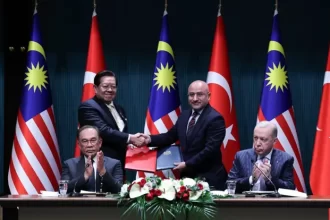China’s Foreign Minister Wang Yi has expressed strong condemnation of Japan’s recent statements regarding Taiwan, calling them “shocking” and warning that Tokyo has crossed a red line that must not be touched. The remarks, issued in an official statement on Sunday, have intensified tensions between the two countries, which have been fraught for more than two weeks.
Wang, the highest-ranking Chinese official to comment publicly on the matter, accused Japanese Prime Minister Sanae Takaichi of attempting to involve Japan militarily in Taiwan. His statement referenced Takaichi’s November 7 comments in parliament suggesting that a hypothetical Chinese attack on Taiwan could provoke a military response from Tokyo.
The diplomatic row, the most serious between China and Japan in years, has already begun affecting trade and cultural relations. On Friday, China raised the issue with UN Secretary-General Antonio Guterres, asserting its right to defend itself.
Beijing considers Taiwan part of its territory and has not ruled out using force to assert control. Taiwan, which operates as a democratically governed entity, rejects China’s claims and maintains that only its people can decide the island’s future.
Japan’s Foreign Ministry did not immediately respond to Wang’s statement on Sunday. However, on Saturday, in response to China’s UN letter, Japan dismissed the claims as “entirely unacceptable” and reaffirmed its commitment to peace.
Taiwan’s Foreign Ministry also criticized China’s letter, saying it “contains rude and unreasonable content” and “maliciously distorts historical facts”, violating the UN Charter’s prohibition against the threat or use of force in international relations.
Wang emphasized that China would “resolutely hit back” to protect its sovereignty and territorial integrity, framing it as a defense of postwar achievements secured through blood and sacrifice. He further warned that if Japan persists in its current course, countries and citizens worldwide have the right to re-examine Japan’s historical actions and resist any resurgence of militarism.
China remains a crucial trade partner for Japan, buying approximately US$125 billion in Japanese goods in 2024, mainly industrial equipment, semiconductors, and automobiles, making this diplomatic friction particularly significant for global markets.
In essence, the situation underscores how historical tensions, regional security concerns, and economic interdependence continue to intertwine, reminding the world that diplomacy and careful dialogue are critical in navigating East Asia’s complex geopolitical landscape.








